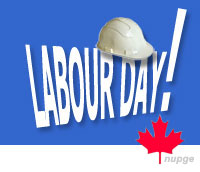On Labour Day 2009 everyone should give a special thanks for union power and hope that it grows stronger.
Of course, this is not a message you read every day and some people may even be angered by it, but the truth is our society depends on unions to say “no” to the destructive forces unleashed by capitalism’s economic downturns.
As an elected union official I’ve seen the demands for cutbacks and concessions grow since the beginning of the year. When the economy turns down the reaction of many companies is to cut back on spending. Often this means chopping wages. Sometimes it means chopping jobs. This makes sense to the owners of individual companies, to management and even to some workers.
But, what does it mean to the economy as a whole? It means all the affected workers have less to spend on the goods and services that other companies provide. This leads to further cutbacks at those companies, which leads to further cutbacks at other companies, which leads to some of those companies going out of business, which leads to more cutbacks at other companies, which leads to …
It means that some workers who took out mortgages in better times may no longer be able to afford their monthly payments. This leads to forced sales and downward pressure on house prices. While this can be good for some people in overheated housing markets it also leads to personal bankruptcies and foreclosures and huge losses for banks and other financial institutions.
In Canada, the U.S. and other countries this has led to trillions of dollars in government bailouts. It also leads to fewer houses being built, which means a drop in construction jobs, which leads to more people unable to afford their mortgages, which leads to …
It means that workers pay less taxes on their reduced incomes. That leads to falling government revenue, which leads to pressure to cut services, which means more job cuts, which means even greater drops in taxes, which leads to …
So, when a union has enough power to say “no” to a wage cut or is able to prevent jobs from being lost, in fact everyone benefits, not just its members. But that is just a part of the good that unions do in troubled economic times.
Most unions, certainly all the good ones, push for broader social policy changes that also help protect us against the downward economic spiral that leads us from a downturn to a recession and then to a depression.
What are some of the social policies that unions have fought for and won that also help us to weather the storm currently battering the world economy?
Unemployment insurance is an obvious one. Old age pension, the Canada Pension Plan and social assistance are others. Higher minimum wages too.
All these help stabilize our economy by providing a floor, which helps prevent millions of people from sinking into the situation that many faced in the 1930s when tag days, work camps and riding the rails were experienced by our parents and grandparents.
Unions have also fought for and continue to demand jobs for everyone who wants one. It makes no sense that we continue to have an affordable housing crisis while unemployment is rising amongst construction workers and lumber mills are shut down.
Unions lobbied governments hard for strict regulations on the financial industry, to prevent banks and other companies from engaging in the kind of practices that were a major cause of the current economic crisis, especially in the United States, the Baltic countries and Iceland. Unions were at least partly responsible for the stronger regulations in Canada that helped this country’s banks survive better than most and that the government now touts as a model to the world.
Around the world, where unions are strong so too are social policies that help people in bad economic times. One national newspaper recently ran a story that demonstrated this link between policies that unions typically promote — strong regulations, high minimum wages, protection against layoffs, broad social programs, widespread government involvement in the economy — and much better performance during the current recession.
Of course unions could do better. We should grow and help more people. We should become stronger and use that influence to change our economy to one that makes human need rather than human greed the most important principle.
We should use our power to demand an economy that lives with nature rather than destroy it. If we could build such an economy we would not need to worry about recessions and depressions ever again.
-Gary Engler is the vice president of Local 2000 of the Communication, Energy and Paperworkers Union of Canada, British Columbia’s Media Union.



